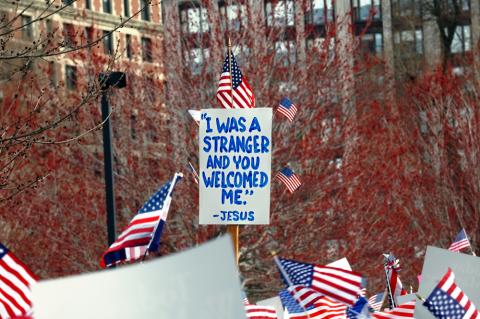
Turning our backs on immigrants is turning our backs on Christ himself.
THE racist, xenophobic right wing evangelical extremist drumpf/trump-pence administration and their like minded supporters are rejecting the teachings of Christianity and Jesus Christ on immigration. No surprise there, these are the same Christians who also have been supporting this administration's policies of greed and misogyny as dictated by their alt jesus.
We all know immigration reform is long overdue, but the goal should not be to make America whiter. Send your senators a message demanding they reject and vote against the drumpf/trump-pence proposals on immigration reform (I did), click the link below.

Sign and send the petition to your senators: Reject Trump 'deal' on the Dreamers. It is a white supremacist wish list, not a starting point for negotiations.
Donald Trump claims he'd be willing to support a pathway to citizenship for the 1.8 million undocumented immigrants brought here as children, but it comes with a HUGE catch.
The "deal" he has offered Congress would include $25 billion on border security (such as his infamous wall with Mexico), and make fundamental changes to immigration policy regarding the visa lottery and sponsoring relatives. Legal immigration would be cut by 50%!
This is not a serious start for negotiations. It's a legislative burning cross, using the Dreamers as pawns to get every anti-immigrant, racist item on the white supremacist wish list.
Sign and send the petition to your U.S. senators. Reject Trump's "deal" on the Dreamers. It's not a good-faith offer, and it's not a starting point for negotiations. It's a legislative burning cross.
By 9-05-2017
But our citizenship is in heaven, and from it we await a Savior, the Lord Jesus Christ(Philippians 3:20)
Christians shouldn’t extoll the virtues of being a citizen in heaven if they’re willing to deny people a citizenship on earth.
When a stranger sojourns with you in your land, you shall not do him wrong. You shall treat the stranger who sojourns with you as the native among you, and you shall love him as yourself, for you were strangers in the land of Egypt: I am the Lord your God. (Lev. 19:33-24)
President Donald Trump’s decision to deport our neighbors, students, coworkers, friends, and family is a great injustice. Although people can be given labels such as ‘alien,’ ‘immigrant,’ ‘undocumented,’ and ‘illegal,’ as Christians we should know that immigrants — regardless of their legal status — are individuals deeply loved by God and created in God’s Divine image.
Sure, there may be political and ideological reasons to deport immigrants, but there are no theological ones, and whether you like it or not, Christians are called to help them.
“You shall not wrong a sojourner or oppress him …” (Ex. 22:21)
“So whatever you wish that others would do to you, do also to them, for this is the Law and the Prophets.” (Matt. 7:12)
If Christians refuse to take up the cause of the immigrant, or are apathetic toward the plight of those in DACA, or the countless individuals facing deportation, we are ignoring, misinterpreting, and even blatantly rejecting Jesus’s teachings and various texts throughout the Bible (Jeremiah 22:3-5 ; Zechariah 7:8-10 : Matt. 25:34-40 ; Heb. 13:1-2 ).
Unfortunately, the chance to be radically countercultural — to glorify Christ through selfless sacrifice, hospitality, and generosity — is being squandered for the sake of legalism, where “the law” supersedes any form of grace, mercy, or love.
Those who reference Romans 13:1 (“Let everyone be subject to governing authorities”) to justify these hardline immigration policies fail to realize that this Scripture assumes this “submitting” is coinciding — and never contradicting — the supreme call to love God and love others.
Teacher, which is the great commandment in the Law?” And he said to him, “You shall love the Lord your God with all your heart and with all your soul and with all your mind. This is the great and first commandment. And a second is like it: You shall love your neighbor as yourself. On these two commandments depend all the Law and the Prophets . (Matt. 22: 36-40).
Using Romans 13 to oppress and malign immigrants also contradicts the words of Peter when he tells the apostles, “We must obey God rather than men” (Acts 5:29) and the teachings of Jesus himself when he proclaimed “no one can serve two masters” (Matt. 6:24). It’s important to remember that Jesus himself was a law-breaker, arrested and crucified legally under the jurisdiction of Roman law.
Ultimately, turning our backs on immigrants is turning our backs on Christ himself, who famously tell us to love others as we would ourselves, but also asks what do you benefit if you gain the whole world but lose your own soul (Mark 8:36).
If you’re fine with an entire group of people being deported because of racism, xenophobia, and bigotry that’s guised under the pretenses of domestic policy, federal law, and political rhetoric — you’re losing your soul.
If you’re fine with people having their education taken away, careers destroyed, and forcibly displaced from family, friends, and loved ones — you’re losing your soul.
If you’re diminishing the humanity and worth of others because you think “it’s good for the country” — you’re losing your soul.
In the entire history of the world, when has a forced mass deportation been interpreted as anything less than a tyrannical act of oppression? And when the majority race of a privileged population oppressively excludes the population of another race, when has it ever been thought of anything less than a form of outright evil?
By deporting immigrants and ending DACA, we are condemning countless young people — deeply loved individuals created by God — to misery. To support this is to deny our faith’s responsibility to represent Christ.
The Christian answer to immigration is the same for every other problem the word is facing: love others and love God. This Christ-inspired, Christ-fueled, and Christ-like love isn’t going to be the easiest, or most efficient, or most plausible, or most popular — but it should be the most loving.
“Then the King will say to those on his right, ‘Come, you who are blessed by my Father; take your inheritance, the kingdom prepared for you since the creation of the world. For I was hungry and you gave me something to eat, I was thirsty and you gave me something to drink, I was a stranger and you invited me in, I needed clothes and you clothed me, I was sick and you looked after me, I was in prison and you came to visit me.’
“Then the righteous will answer him, ‘Lord, when did we see you hungry and feed you, or thirsty and give you something to drink? When did we see you a stranger and invite you in, or needing clothes and clothe you? When did we see you sick or in prison and go to visit you?’
“The King will reply, ‘Truly I tell you, whatever you did for one of the least of these brothers and sisters of mine, you did for me.’ — Matthew 25: 34-40
Christ is love; deportation of these young immigrants is not. May we choose to be like Christ, may we choose to love. God help us.



No comments:
Post a Comment